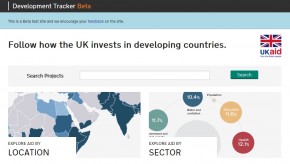My name is John Adams and I lead the technical team publishing data from our internal IT systems as part of DFID's transparency commitments. As part of our #digitaldevelopment blog group, I'll be sharing some of our experiences of publishing and using DFID open data.
In December 2012, the Secretary of State launched the Aid Transparency Challenge, calling for increased publication and use of open aid data, and announcing the prototype version of the Aid Information Platform. This week we have released the Beta version of the Development Tracker for public review and comment. This is a new web tool that allows people to view information about UK development projects, including documents and detailed financial transactions. The site uses open data produced by DFID and other development delivery partners. By re-using our own open data (expressed more colourfully as "eating your own dog food"), there is a very strong incentive for us to continually improve the quality of the data.

The UK has been leading the way on transparency of development data and the Development Tracker builds on the work we've done. In January 2011 DFID was the first organisation to publish data in the International Aid Transparency Initiative (IATI) standard format, and we have continued to update our data monthly since then. The IATI standard is a relatively new international standard for international development data and allows ready comparison of information from different donors. There are now over 140 IATI publishers, and the data is beginning to transform the extent of information available on international development.
This video from the Make Aid Transparent campaign is a good introduction to why this international standard is important to making development more effective.
Because we are using an open standard (IATI), we can also import data from other publishers into the Development Tracker. We are already using data provided by the Department of Energy and Climate Change (DECC), and will be incorporating data from other UK government bodies as they publish to IATI.
But crucially, we are incorporating data published by our development delivery partners, initially on a small-scale to prove the concept that development can be traced through the delivery chain using open data. The Global Poverty Action Fund example shows data published by a number of partners, and really shows the promise of this approach. Our goal is to be able to use open data to trace the delivery of development from donor to beneficiary, helping to maximise aid effectiveness.
The site also shows mapping of international development projects at sub-national level, which has been carried out initially in Bangladesh.
For the geeks among you, we have also produced an API (application programming interface) enabling you to get hold of the data in JSON format. There's more to develop for the API, so we welcome your feedback. And finally, we will be making the source code for the Development Tracker available very soon, so that others can freely re-use or even contribute to the code. This may give other organisations a good starting point in visualising their own data, and encourage a community of innovative developers to build, share and re-use interesting visualisations built on the data.
We would very much welcome your comments on this Beta tool and the future direction it should take.
Visit the Development Tracker and email your feedback to DevTracker-Feedback@dfid.gov.uk or tweet us @DevTracker_UK.

4 comments
Comment by Mwesigye posted on
I appreciate what the UK is doing for African developing countries,thanks
Comment by DFID’s International Development Sector Transparency Panel: First Meeting | Indigo Trust posted on
[...] last week in beta form. It has been renamed the Development Tracker and you can read about it here. John has also previously written an article about this platform for Bond. The photo [...]
Comment by Brian Ndyaguma posted on
How would one participate especially if they have a similar solution for their society? Personally I am in Uganda and working on an eMonitoring tool for resources always provided to facilitate the success of projects. I have a background in Project Management specializing in Monitoring and Evaluation.
Comment by 7 June: Engage-ing links | Engage posted on
[...] for International Development’s (DFID) business innovation team, John Adams, writes about the release of their Development Tracker website, which is a tool that allows people to view information about UK development projects. The release [...]